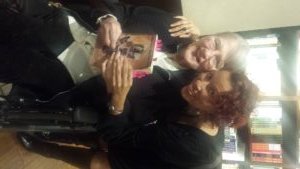A Race Relations Hero Dorothy Hampton Marcus A Southern White Woman Story About Race
Katherine “Kaypri” Marcus is the co-author of the book, “I Didn’t Know What I Didn’t Know: A Southern White Woman’s Story About Race” along with her mother Dorothy Hampton. Kaypri sat down with Lisa Williams and shared her mother’s story about growing up as a southern white woman in the 1930s. Kaypri shared how the lessons she learned from her mother has shaped her outlook on the current events of social injustice in today’s society.

Lisa: Hi, this is Lisa Williams with Small Business Trendsetters and today I am speaking with Kaypri. How are you today, Kaypri?
Kaypri: I am well, how are you doing?
Lisa: Excellent. Kaypri is the daughter and co-author/editor for the book, “I Didn’t Know What I Didn’t Know,” an autobiography written by her mother, Dorothy Hampton Marcus, a southern white woman, sharing her story about race. Kaypri finished writing the book due to her 82 years old mother’s memory loss. So, Kaypri, there is quite a bit to discuss; some of the recent strategies and racial profiling situations in the news to the depth, of your mom’s book, “I Didn’t Know What I Didn’t Know.” Let’s start by you telling us briefly, what the book is about and what the title means.
Kaypri: Well, the title actually refers to an expression that my mother learned about in one of the Race workshops where she served as a consultant. She heard African-Americans talk about how historically the way someone did something that they saw as being racist, they would say, “Well, he didn’t know what he didn’t know,” or “She didn’t know what she didn’t know.” What she writes in the book is that she believed it came out of old black folk wisdom. When she heard this term and she writes in the book, she insisted on that being the title of the book, “I Didn’t Know What I Didn’t Know.”
However, the way she became a missionary was very different way from what she expected. She fell into situations where she was part of major civil rights history and didn’t realize it at the time and she had absolutely no idea how revolutionary she was. That’s where “I Didn’t Know What I Didn’t Know” came from. In addition, “A Southern White Woman’s Story About Race” is just kind of laying it out, like her point of view on what she learned along the way. It is a very honest account throughout the book; I was able to pull original journal entries and put them in throughout the book where you can hear her actual words, inside the chapters she completed. Therefore, you’re hearing what she was saying as she wrote the book, but then you have the actual words as she was in the moment, and that to me is so powerful. Because it just showed her frustration, her anger, and her trying to work things out and not realizing until later on in her life I was doing the right thing. In addition, I was right but I didn’t understand this person, didn’t understand how things were for her, I didn’t know I was right and I didn’t begin to know until years and years later.
Lisa: Let’s talk about your dad for a minute. This southern white woman married an African-American, back then Negro, man. How did that come about, and can you speak to some of the challenges they faced as an interracial couple?
Kaypri: Yes. Well, at the time, most people were familiar with the Loving story in Virginia, the interracial couple that sued to get married. My parents were secretly dating at that time and what made it worse is that they worked together only they didn’t work in the same place every single day. It was one of those jobs where you are working with someone in another state. Nevertheless, when they had to attend different conferences or meetings they would be holding hands under the tablecloth, which is one of the stories that she shared with me. So one of the places they would see each other was at Fisk University where there used to be, a race institute, where my Mom saw many activists speak, who went on to become well known. So my parents actually dated secretly on and off for well over a decade until the climate changed. This was after the March on Washington and Civil Rights Act etc. and my Mom was approaching 40, so she called him up and was like, “I think we have some unfinished business,” and three months later they were married, and then the next year I came. So it was a very…
Lisa: How long did they date before they got married?
Kaypri: My guess is between ten, fifteen years… they met in the late ‘50s and they got married in ‘72.
Lisa: And at a certain point, I believe they questioned if they would keep their relationship because the work that they were both doing was a priority for both of them, correct?
Kaypri: Yeah, they felt their work was, as she termed it, very delicate, and so they grieved that they weren’t going to continue this relationship. Their work brought them together. It’s somewhat like, they are trying to stay away, but it was nearly impossible because they were working together.
Lisa: So what encouraged you or motivated you to complete the book, and what are your plans for the book now that it’s published?

